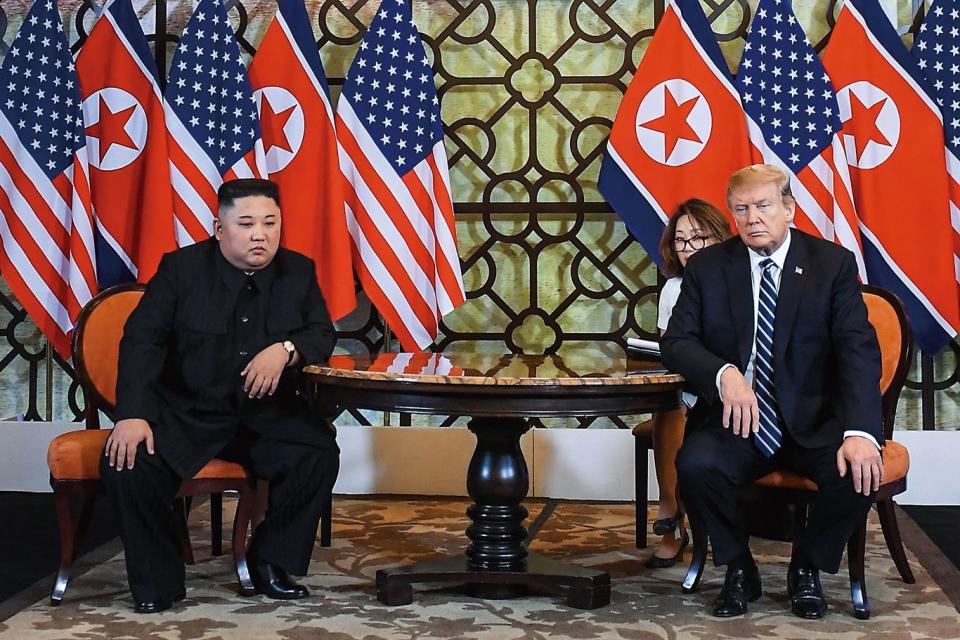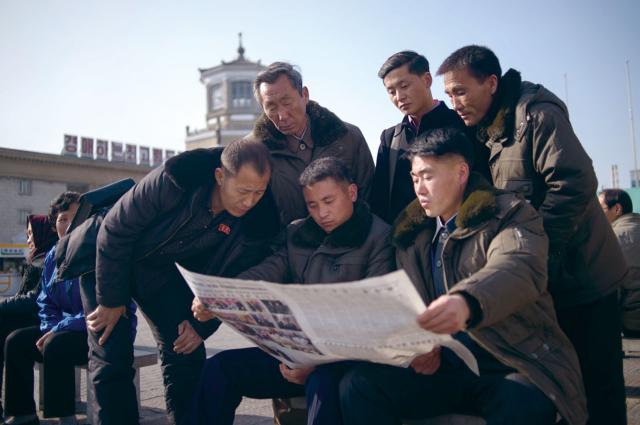It appears that when arguably the world’s two most volatile leaders, US President Donald Trump and North Korean leader Kim Jong-un, meet up, there is no shortage of drama.
When Trump and Kim reconvened on the first day of their second summit in Hanoi, Vietnam on February 27, 2019, the atmosphere seemed amicable, with both leaders exchanging smiles, shaking hands and pledging a “great” outcome. But after a one-to-one meeting the following day ended earlier than expected, the summit collapsed with a scheduled lunch and signing ceremony abruptly canceled.
Prior to the first summit held between the two in Singapore in June 12, 2018, Trump sent journalists, organizers and observers on a rollercoaster ride when he first announced the summit, then canceled it, then again reinstated the meeting, all within 24 hours.
Washington and Pyongyang offered different versions on what went wrong during the Hanoi talks. According to Trump, speaking to the press after the talks collapsed, Kim wanted international sanctions lifted entirely, though Pyongyang swiftly contradicted this claim in a hastily arranged press conference. According to North Korean Foreign Minister Ri Yong-ho, Pyongyang offered “realistic proposals,” seeking only to partially lift sanctions that were hurting its economy and people’s livelihoods. In return, North Korea would dismantle the Yongbyon nuclear complex.
It is hard to independently verify which version is closer to the truth. It is possible that both versions have some elements of truth. Citing an unnamed South Korean source, Jin Canrong, a veteran expert on Korean issues and a professor of international relations at the Renmin University of China, said that Pyongyang had requested Washington to lift five of the existing 11 sanctions imposed by the United Nations. While the request was not to lift sanctions entirely, the selected five were considered the backbone of existing sanctions, Jin said, speaking on Today’s Focus, a China Central Television (CCTV) current affairs program.
While this version may offer some insights on the discrepancy between the positions of Pyongyang and Washington, it could not explain why Trump apparently walked away from the talks. After all, it is inconceivable that the two sides had not reached some kind of mutual understanding before a summit at the highest level like the one between Kim and Trump would have been arranged.
North Korean Vice-Foreign Minister Choe Son-hui told the media after the collapse of the talks that both sides had made progress and hoped that they could “take another big swing” when the leaders got together. Instead, Choe said that Kim was baffled at Trump’s reaction. The North Korean leader “got the feeling that he didn’t understand the way Americans calculate.”
For many analysts, the answer to Trump’s calculation lies in the domestic politics of the US, which drew much media attention away from the Trump-Kim talks, especially in the US. On the same day, Trump’s former lawyer Michael Cohen testified before Congress, saying Trump was “a racist. He is a con man, and he is a cheat.”
Prior to the summit, Trump’s critics had accused him of using the summit as a distraction from his domestic woes. Speaking to US broadcaster CNN, Princeton University history professor Julian Zelizer warned that Trump might sign a “bad deal” with North Korea as a distraction.
Signing an agreement with Kim, which would have to include partial lifting of sanctions to be acceptable to Pyongyang, would subject Trump to criticism not only from his democratic foes, but also from Republican hawks. Walking away from the talks may have seemed the preferable choice as Trump is facing pushback from multiple fronts back in the US.
And he did receive bipartisan praise from major Democratic leaders such as House Speaker Nancy Pelosi and former vice-president Joe Biden, and Republicans such as Senate Majority Leader Mitch McConnell.
Trump appeared to attempt to shift the blame for the failed talks onto his political foes. “For the Democrats to interview in open hearings a convicted liar & fraudster, at the same time as the very important Nuclear Summit with North Korea, is perhaps a new low in American politics and may have contributed to the ‘walk,’” he tweeted on March 4.
With the fallout from the second Trump-Kim summit, the next question is where the parties go now. In Hanoi, Trump insisted that despite the lack of a deal, the summit was still “productive,” and that his walking-away was “friendly,” and did not mean he was on bad terms with Kim. US Secretary of State Mike Pompeo also said that he is hopeful the US and North Korea will “be back at it.”
From the perspective of the Trump administration, despite the breakdown of the summit, the US left with the upper hand. If the current status quo can hold until the end of 2020, Trump can still claim that he has achieved what the Obama administration had failed to do – the suspension of Pyongyang’s nuclear and missile tests, even when there has been no substantial progress in having Pyongyang abandon its nuclear arsenal. According to Trump, Kim has assured him that North Korea will not resume missile or nuclear tests.
In return, the only apparent concession made by the US is the suspension of two joint military exercises with South Korea in the spring. According to Trump, the decision announced by US officials immediately after the summit on March 1 was not related to his talks with Kim and was for the benefit of the US. “I made that decision long ago because it costs the US far too much money to have those ‘games,’ especially since we are not reimbursed for the tremendous cost!” Trump tweeted.
For China, the breakdown of the summit may be a disappointing but predictable result. After the summit, Yang Jiechi, China’s top diplomat, spoke with US Secretary of State Mike Pompeo on the phone, acknowledging that the Korean peninsula issue is complex and “difficult to solve overnight.”
According to Jin Canrong, if the status quo resulting from the summit – that North Korea will suspend nuclear and missiles tests in exchange for the US suspension of military exercises – can hold, it is a positive result for China. After all, it is exactly what Beijing has been calling for in the past couple of years in its so-called “dual suspension” proposal. The key question now is how North Korea evaluated the outcome, Jin said.
For almost two weeks following the fallout from the summit, Pyongyang neither confirmed nor denied Trumps’ claim that Kim promised not to resume nuclear and missile tests, nor did it
respond to the US announcement of a suspension of the joint military exercises with South Korea, or even whether it will continue to talk with the US.
When Kim returned to Pyongyang, he was greeted by enthusiastic crowds and a hero’s welcome, with North Korean State media hailing his trip as an enormous success.
North Korean State TV aired a documentary about the trip, in which Kim was quoted emphasizing that North Korea and the US must put an end to their decades-long animosity and confrontation, which some analysts interpreted as a sign that Pyongyang will continue negotiations.
According to Yang Xiyu, a senior fellow at the China Institute of International Studies, the collapse of the Trump-Kim summit does not mean the collapse of the overall negotiations.
“Past experience tells us that negotiations over the denuclearization of the Korean peninsula have always been complex, and have never completely stopped,” Yang told China’s State-run Xinhua News Agency. As all parties expect to benefit from the denuclearization process, the negotiations will continue, Yang said.
But many remain skeptical. Jin argued that Kim, who traveled for dozens of hours by slow train through China to get to Hanoi, went back almost empty-handed. He secured neither security guarantees nor economic support in the form of lifting sanctions from the US. Trump’s rhetoric about the “tremendous” economic potential of the country remains an illusion.
“The two leaders may just have missed the best opportunity to reach a deal,” Jin said. “As Trump’s priority will shift to the presidential campaign in late 2019 and 2020, there will be minimal time for a much-talked up third summit between the two, let alone a major breakthrough.”
It seems that Pyongyang has started to send its true message. Only days after the summit, the Washington-based Center for Strategic and International Studies released satellite images, claiming that North Korea’s Sohae Satellite Launching Station in Tongchang-ri has seen rapid rebuilding and may have “returned to normal operational status.” Kim agreed to shut down the Tongchang-ri test site after a summit with South Korean President Moon Jae-in in September 2018.
The US State Department responded that it was too soon to draw conclusions, but Trump's national security advisor John Bolton threatened that new sanctions could be introduced if Pyongyang did not abandon its nuclear weapons program.
As US-North Korea negotiations look to be in stalemate yet again, China’s Foreign Minister Wang Yi called for the two sides to come up with a “general roadmap” in “a phased and synchronized” fashion.
“All parties should have reasonable expectations. We should not set a threshold too high, nor should we unilaterally impose unrealistic demands,” said Wang on the sidelines of China’s annual session of the National People’s Congress in March.
“The key to solving the issue lies in not being a prisoner of history but in breaking the cycle of mistrust,” Wang added.
Finally, after staying silent for more than two weeks, North Korea’s Vice-Foreign Minister Choe Son-hui told reporters on March 15 in Pyongyang that Kim Jong-un is considering suspending talks with the US and may resume its missile and nuclear tests unless Washington makes concessions.
Accusing Mike Pompeo and John Bolton of creating hostility and mistrust between Kim and Trump, Choi said Pyongyang has no intention of yielding to US demands from the Hanoi summit, nor is it willing to engage in negotiations of this kind, though Choi said personal relations between the two leaders remain good and the chemistry is “mysteriously wonderful.”
It seems that Pyongyang too is taking an approach of combining threats and incentives in its talks with the US. With a lack of basic trust and a gap between the positions of Washington and Pyongyang, despite two summits between the two leaders, the prospect of eventual denuclearization on the Korean Peninsula appears to remain as uncertain as ever.

 Old Version
Old Version
